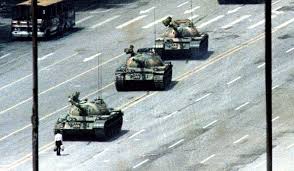
Recently, Pierre Lemieux quoted my comment on a pre-release viewing of Robert Anthony Peters’s new short film, Tank Man in a post here at EconLog. I said the film made me cry, and that it’s a beautiful story. And that you should see it if you get a chance.
Now that the film is online and available to the public, you have your chance, so I thought it might be worth spending a little time talking about what I found so effective about the film.
[The remainder of this post will contain spoilers for Tank Man, so if you haven’t seen it yet, take 15 minutes, click here, watch it, and then come back to the post.]
Tank Man explores one of the most memorable photos of the 20th century. In it, a single man, dressed in a plain white shirt and black trousers, holding what appears to be a shopping bag, stands in front of a line of tanks in Tiananmen Square. The day before, Chinese troops had attacked pro-democracy protestors in the Square, and as the tanks rolled in, this one citizen appeared to have hit his limit. He stood in front of the tanks, waving his arms and facing them down. Tank Man, as he came to be known, was never identified and no one knows what became of him, but he remains a symbol of resistance to people around the world.
Peters’s movie seeks to fill in the unknowable story that led to the moment when this anonymous man decided to take a stand. In doing so, Peters makes an important choice.
It would have been easy to write a background story for Tank Man that imagined the hero as a political spitfire. After spending the day meeting with fellow revolutionaries and reading inspiring literature, he stout-heartedly marches to Tiananmen Square and faces down the tanks, with words of wisdom and inspiration on his lips, and the fire of freedom in his heart.
Peters doesn’t give us that story.
Instead, Peters gives us the story of a perfectly ordinary man, Jinyang. As the film opens Jinyang reads his son a Chinese fable about ants who sacrifice their lives to save their fellow ants from a fire. The family is wakened at night by the sound of gunfire from Tiananmen Square. As they begin their day, they silently listen to news reports of the violence.
Jinyang heads out to his office to finish some paperwork, though cautioned by neighbors and friends that it is very dangerous to be outside right now. He objects that the protesters in the Square are “Just causing trouble” and tells a concerned neighbor that there is nothing they can do. Other local connections try to get him involved in the protest, but he consistently declines.
On the way home from work he stops at a small local store to buy some food. The shopkeeper’s son has been missing since the protests began. As she packs up some supplies for Jinyang, he has a brief and frightening encounter with the military, who arrest the shopkeeper for her son’s activities, and threaten to shoot our hero if he doesn’t just go home.
It is this moment that turns our quiet father and husband into Tank Man. He walks toward Tiananmen Square, retelling himself the story he read his son, thinking about the sacrifices that the ants made to save their compatriots. He sees the line of tanks approaching, and he steps in.
Here, Peters deftly cuts from his film to the news video footage of the real Tank Man, blending his vision with historical truth.
But why did the film make me cry?
A few years ago, I wrote a piece about the Netflix series, Daredevil, and noted that, for me, the perfectly ordinary guy who acts like a hero is far more heroic than anyone with superpowers.
I like the heroes who, on their bad days, can barely catch the bus on time. The ones who spill coffee on their shirts right before a big meeting with the boss. The ones who don’t fit. The ones who sometimes can’t quite manage.
These are my favorites.
They’re my favorites because their stories don’t tell us to look to the sky to save us, or to hope for help from a distant galaxy, or to put all our faith in the capabilities and powers of one person. Their stories don’t tell us that the way to make the world better is to let the guys with the fancy gadgets solve our problems. Their stories tell us that the people to put their faith in are the ones who work hard — the ones who are accidentally heroic at first, and then keep it up because their accidental powers turn out to come with great responsibilities. The ones who try to protect their homes, or families, or neighborhoods because they know them and love them — not because they think they know what’s best for everyone.
They tell us that the people who can save us are the ones who are pretty much like us.
Tank Man, whoever he was, is that kind of hero. And Peters’s film reminds us that we all have the potential to be that kind of hero, if we are brave enough to face the tanks ahead of us, not knowing what will happen.

READER COMMENTS
John Alcorn
Jun 11 2019 at 7:24pm
Is the tank driver, too, a hero?
Comments are closed.